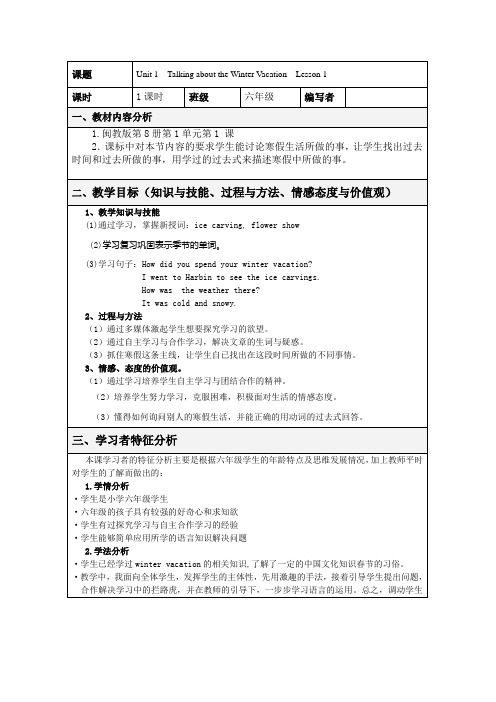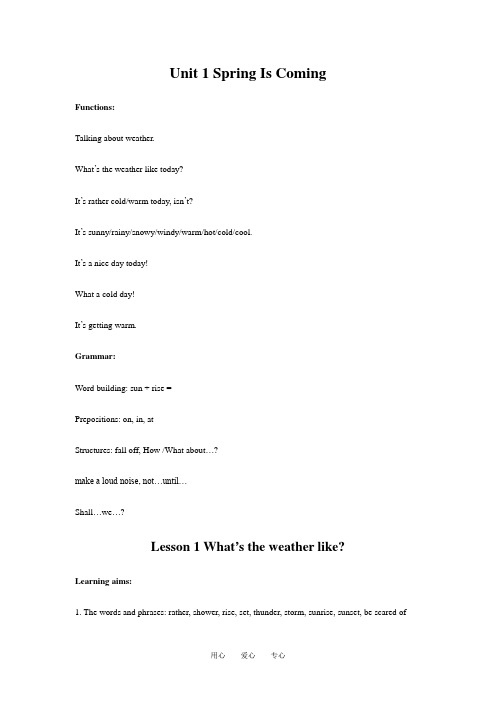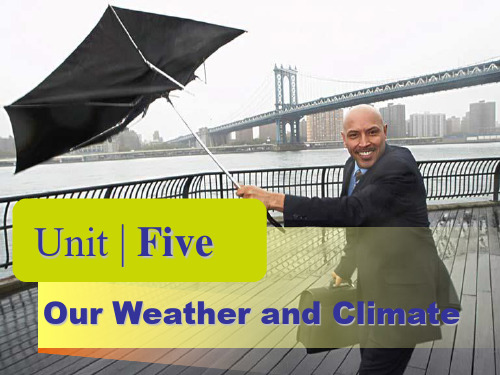Unit One Talking About Weather
- 格式:doc
- 大小:454.00 KB
- 文档页数:8


Unit 1 Greetings (日常问候)Part Ⅰ Leadin 导言"良好的开端是成功的一半",正如谚语所告诉我们的一样,一个富有吸引力的交谈和持久的友谊首先是以问候开始的。
力的交谈和持久的友谊首先是以问候开始的。
在我们的日常生活交往中,在我们的日常生活交往中,在我们的日常生活交往中,善意和善意和得体当然是好的问候语的关键。
社交中的套语是外语学习者开始学习表达的基础。
亲朋好友、熟人之间见面时打招呼,也是文明社会的礼仪和标志。
在日常交往中,有时也会寒暄几句,略谈"天气、健康、衣着、发型"等话题,以融洽人们之间相互的人际关系。
之间相互的人际关系。
Part Ⅱ Useful Sentences 常用句型1. 问候语:问候语: Hello / Hi /Hey! / Hi, there! / Hello, everyone! 你好!(熟人之间见面问候语) 回答语:回答语: Hello/Hi /Hey! 你好!(熟人之间回答语) 2. 问候语:问候语: Good morning / Good afternoon / Good evening ! 你好!(早上或上午/下午/傍晚见面问候语) 回答语:回答语: Good morning / Good afternoon /Good evening ! 你好!(早上或上午/下午/傍晚回答语) 3. 问候语:问候语: How do you do? 你好!(初次见面,经人介绍后的问候语) 回答语:回答语: How do you do ? 你好!(初次见面后的回答语) 4. 问候语:Your name, please? / May I know your name? /Could (Would) you give me your name? 请问你贵姓?请问你贵姓?回答语: Sure/Of course. My name is…回答语:当然可以。

Unit 1 Spring Is ComingFunctions:Talking about weather.What’s the weather like today?It’s rather cold/warm today, isn’t?It’s sunny/rainy/snowy/windy/warm/hot/cold/cool.It’s a nice day today!What a cold day!It’s getting warm.Grammar:Word building: sun + rise = ___Prepositions: on, in, atStructures: fall off, How /What about…?make a loud noise, not…until…Shall…we…?Lesson 1 What’s the weather like?Learning aims:1. The words and phrases: rather, shower, rise, set, thunder, storm, sunrise, sunset, be scared of2. The important sentences:①What’s the temperature? It’s ten degrees.② It’s rather cool today, isn’t it?③I’m scared of thunder.Learning important and difficult points:1. What’s the weather like today? It’s cold, cool, warm.2. What’s the temperature? It’s ten degrees.3. be scared of sb./sth.4. There will be… = There is/are going to be …Learning method:Listen, say, read and write.Learning steps:Step 1. TalkingTalk about the weather, the weather report and the temperature. Step 2. ReadingRead the dialogue, and then answer the question.What’s the temperature?Step 3. ExplainingExplain 1. 一般将来时be going to do sth. = will do sth.2. 询问温度是多少要用: What’s the temperature?Step 4. PracticePractice the dialogue in three.Step 5. Act outAct it out in class.Step 6. Do exercisesStep 7. HomeworkLesson 2 It’s getting warmer!Learning aims:1. The new words and language points: become, fact, daylight, melt, lightning, fascinating, go up, make a loud noise2. The important sentences:①What’s the date today? It’s March twenty-first.② In Spring, the weather becomes warmer.③ The temperatures goes up.Learning important and difficult points:Ask and describe the weather of spring.1. What is spring weather like?2. It becomes warmer. The temperature goes up!Learning method:Listen, say, read and write.Learning steps:Step 1. CheckCheck Lesson 1: ask some students to act the dialogue out. Step 2. LearningLearn the new words. Read and write.Step 3. LookingLook at the pictures and read it.Step 4. LearningLearn it. Find out the useful expressions.Step 5. PracticePractice the dialogue.Step 6. ExercisesStep 7. Homework: Describe spring.Lesson 3 Postcard Learning aims:1. The words and phrases: road, outdoors, cycling2. The important sentences:① Spring has arrived in Shijiazhuang.② I see many people in the park exercising.③We won’t see any flowers until May.④ The sun will set in about fifteen minutes. Learning important and difficult points:1. 区分arrive 与reach2. not…until… “直到……才”They didn’t leave until they finished the work. Learning method:Listen, say, read and write.Learning steps:Step 1. RevisionRevise the words of Lesson 1 and 2. Step 2. Learning (A)Learn the new words. Read and write. Step 3. Learning (B)Learn the text.Step 4. ReadingRead the text and recite it.Step 5. ExerciseStep 6. Homework: Recite the dialogue.Lesson 4 Sun is rising Learning aims:1. The words and phrases: climb, change, hillside, gently, blossom, one by one2. The important sentences:① Weather is warming.②They come in one by one.Learning important and difficult points:1. Sun is rising.2. one by one/year by year/day by dayLearning method:Listen, say, read and write.Learning steps:Step 1. Read the new words and write them down.Step 2. Sing the songLesson 5 Fun in the sunLearning aims:1. The words and useful phrases: shall, outdoors, cycling, go bike riding, hit sb. on the head, How/What about…? Shall we…?2. The important sentences:① Let’s go cycling.② How about baseball?③ Shall we play soccer?④ The ball always hits me on the head.Learning important and difficult points:1. Let’s go cycling.2. How about sth./doing sth.?3. be scared of sb./sth.4. There will be… = There is/are going to be …Learning method:Listen, say, read and write.Learning steps:Step 1. RevisionRevise the words. Have a dictation in pairs.Step 2. Reading and writingRead the new words and write them down till recite them.Step 3. LookingLook at the pictures. Then read it and say.Step 4. LearningLearn the text.1. The weather is so warm today. (划线部分提问)2. It’s twenty-two degrees. (划线部分提问)3. It’s rather warm, isn’t it? (改为过去式)4. We shall play soccer. (改为一般疑问句)Step 5. PracticePractice the dialogue in three.Step 6. FindingFind out the differences between in China and in Canada.Step 7. Do exercisesStep 8. HomeworkAct out dialogue out next class.Lesson 6 Danny the babysitter Learning aims:1. The words and phrases: playground, hold, hold on, come down, push, babysitter, baby sit, bar, swing, turn around, full off, get off2. The important sentences:① Danny is babysitting his cousin Debbie at the playground.② It’s time to stop swinging.③ Debbie gets off the swing.Learning important and difficult points:1. stop doing sth./to do sth.2. It’s time to stop doing sth.3. get off, get on4. come on/some downLearning method:Listen, say, read and write.Learning steps:Step 1. RevisionCheck the dialogue.Step 2. Reading and writingRead the words and write them down.Step 3. Looking and sayingLook at the pictures and say it in English.Step 4. Reading the dialogue in fourThen find out the useful expressions.Step 5. ExplainingGo over:get on /off /to /in /from /along withcome down /on. /from /in /outtime three times, new timesStep 6. PracticePractice the dialogue in four.Step 7. HomeworkAct the dialogue.Lesson 7 Danny’s “Debbie” Day Learning aims:1. The new words: herself, party, all day2. The important sentences:① I thought about it all day at school.② I thought it would be easy to baby sit there.③ I was scared that she would hurt herself.④ My aunt and uncle had made sandwiches for us to eat at the playground.⑤ So was I.⑥ I help her brush her teeth and climb into bed.Learning important and difficult points:1. It is easy to do sth.2. oneself 反身代词的用法3. So was I.e.g. He is tall. So am I.4. help sb. do sth. = help sb. with sth.Learning method:Listen, say, read and write.Learning steps:Step 1. Revision1. Revise the words.2. Check the dialogue.Step 2. Reading and writingRead the words and write them down.Step 3. ReadingRead the diary by themselves and find out the useful expressions.Step 4. Explaining1. would do 过去将来e.g. I was scared that she would hurt herself.2. Had done.e.g. They had made sandwiches for us to eat at the playground.Step 5. ReadingStep 6. ExercisesStep 7. HomeworkWrite a diary.Lesson 8 Unit ReviewSummarize vocabulary and grammar:1. rather, shower, rise, set, become, fact, road, climb, one by one, change, shall, kick, hold on, come down, push, plant2. Talking about weather.What’s the weather like today?It’s rather cool/warm/windy/warm/hot/cold.It’s a nice day today!What a cold day!It’s getting warmer.3. sun + light = _______ basket + ball = _______4. prep. in, on, at 的用法。

人教版英语七年级上册 Unit 1单元练习题一、单选题1.—LiLei, is this __________ e-bike?—No, it's not mine. It may be __________.A.yours; her B.your, hers C.you; hers D.your; her 2.Happy birthday, Jim! Here is a card for , with best wishes!A.you, our B.us, your C.you, your D.us, our3.Not only my father but also my grandpa ___________flying to England this weekend.A.is B.are C.was D.be 4.—Hello, Mary! Is he Tony? —____________. He's Nick.A.Yes, he is B.No, he isn't C.Yes, it is D.No, it isn't 5.— I used to be afraid of playing with dogs.—_____ You're getting on well with them now.A.I'm afraid so.B.That's great.C.Really?D.Take it easy.6.— Can you go to the science museum with us this afternoon?— ______. I have to help my cousin with English.A.Yes, please B.Sorry, I can't C.Good idea7.—Was there a computer room in your primary school?—______A.Yes, there is.B.Yes, there was.C.No, there aren't.D.No, there weren't.8.Many European languages use the names of the heavenly bodies (天体) for the days of the week. For example, in English, Sunday is the day of the sun, a traditional day of rest. Monday gets its name from__________.A.the mountain B.the moon C.the mouse 9.Mytelephonenumber_______*************.A.is B.am C.are D.be10.Where ________ your teacher two days________?A.were; before B.was; before C.were; ago D.was; ago二、翻译11.If you require strength in either body or mind, red may (有些帮助) to you.12.你应该对这些学生们宽容一点儿,毕竟他们还都是孩子。


英语日常对话练习一般现在时篇Unit 1: GreetingsA: Hello!B: Hi! How are you?A: I'm good, thank you. How about you?B: I'm fine, thanks.Unit 2: Introducing YourselfA: Hi, I'm Lisa. What's your name?B: Nice to meet you, Lisa. I'm Tom.A: Nice to meet you too, Tom.Unit 3: Talking about NationalityA: Where are you from?B: I'm from China. What about you?A: I'm from the United States.Unit 4: Talking about HobbiesA: What do you like doing in your free time?B: I enjoy reading books and playing soccer. How about you? A: I love playing the guitar and watching movies.Unit 5: Talking about Daily RoutineA: What do you usually do in the morning?B: I usually wake up at 7 am, brush my teeth, and have breakfast. How about you?A: I usually exercise and then shower before getting ready for work.Unit 6: Talking about FamilyA: Do you have any siblings?B: Yes, I have one brother and one sister. What about you?A: I have one sister.Unit 7: Talking about OccupationsA: What do you do for a living?B: I'm a teacher. How about you?A: I'm a graphic designer.Unit 8: Making PlansA: Are you free this weekend?B: Yes, I am. What do you have in mind?A: Let's go hiking or maybe watch a movie.Unit 9: Talking about FoodA: What's your favorite cuisine?B: I love Italian food. How about you?A: I enjoy Asian cuisine, especially Chinese dishes.Unit 10: Talking about TravelA: Have you ever been to any foreign countries?B: Yes, I've been to France and Japan. How about you?A: I've been to Australia and Thailand.Unit 11: Talking about WeatherA: What's the weather like today?B: It's sunny and warm. How about your place?A: It's cloudy and a bit chilly.Unit 12: Talking about SportsA: Do you play any sports?B: Yes, I play tennis and swim. What about you?A: I enjoy playing basketball and running.In conclusion, practicing daily conversations in simple present tense is essential for improving English speaking skills. These dialogues cover a range of topics related to everyday life and can be used as a guide for engaging in conversations with others. Keep practicing and you will gradually become more proficient in English communication.。
Unit 1 单元测试卷得分________卷后分________评价________听力部分(20分)一、听句子,选择正确的答语。
(5×1分=5分)(C)1.A.By reading textbooks. B.By making word cards. C.By listening to tapes.(B)2.A.Yes, I have. B.Yes, I do. C.Y es, I can.(B)3.A.I'd love to. B.Good idea. C.Yes, please.(C)4.A.Me, too. B.You're right. C.It doesn't matter.(A)5.A.I agree with you. B.You're welcome. C.It's too hard.二、听短对话,选择正确的答案。
(5×1分=5分)(C)6.How many mistakes did Li Dong make in the exam?A.One. B.Two. C.Three.(B)7.What do Mary's parents do?A.Writers. B.Teachers. C.Doctors.(B)8.Where are the two speakers probably talking?A.On the street. B.In the classroom. C.In the library.(C)9.Why doesn't Becky like studying grammar?A.Because she thinks it's boring.B.Because she thinks it wastes time.C.Because she thinks it's hard.(A)10.What's the matter with the boy?A.He can't read quickly.B.He can't pronounce the words.C.He can't remember the words.三、听长对话,选择正确的答案。
Unit One GreetingsWell begun, half donePart One Listening and SpeakingTask 1 Ask students to describe the weather of that day. After that, the teacher should give an example about describing the weather of that particular day.Task 2 Please listen to some people talking about the weather.Dialogue 1:A: what's the weather like in Guangzhou?B: It's fiery-hot and humidA:I think so, today is very stuffy and I have been sweating all day long.B: Yes. The maximum temperature here will be 36-Celsius degrees!A: What does the thermometer read now?B:30 degrees.A: Wow, no wonder I'm feeling so hot.Dialogue 2:A:I saw the first snow of the year yesterday!B:U did? Wasn't it beautiful?A: It fell silently in small soft flakes, until the earth was covered with a blanketof white snow.B: AH.....It's a pity I have never seen snow because I live in the south.A: Yes, In the southern parts of china, such as Guangdong province, theclimate is mild and is seldom snows.B: Is it freezing cold when it snows?A: Not exactly, In fact is sometimes colder when the ice is melting!B:I must go to Harbin to see snow this winter!Task 3: Ask students to talk about weather on that specific day. Here are some commonly used expressions about the weather:General greetings (Formal)1. Hello!2. How are you?3. How are you doing?4. How is everything?5. How’s everything going?6. How have you been keeping?7. I trust that everything is well.General greetings (Informal)1. Hi.2. What’s up?3. Good to see you.4. How are things (with you)?5. How’s it goi ng?6. How’s life been treating you?Greeting a person you haven’t seen for a long time (Formal)1. It has been a long time.2. It’s been too long.3. What have you been up to all these years?4. It’s always a pleasure to see you.5. How long has it been?6. I’m so happy to se e you again.Greeting a person you haven’t seen for a long time (Informal)∙How come I never see you?∙It’s been such a long time.∙Long time no see.∙Where have you been hiding?∙It’s been ages since we last met.1. 一般性招呼问候语Morning! 早上好!你好! (不如Good morning 正式)Afternoon! 下好!你好! (不如Good afternoon 正式)Evening! 晚上好 / 你好! (不如Good evening 正式)Good morning. 早上好 / 你好!Good afternoon. 下午好 / 你好!Hello [Hallo, Hullo, Hi]. 你好!How are you? 你好吗?How do you do? 你好! (用于第一次见面)Good [Nice] to see you again. 很高兴又见到你!What a pleasant surprise! 真没想到会见到你!2. 问候久别朋友,表达好久未见这一含义Haven‘t seen you for some time. 好久不见了。
Haven‘t seen you for a long time. 好久不见了。
Haven‘t seen you for ages. 好久不见了。
Long time no see. 好久不见了。
3. 问候工作、学习、生活、身体等情况How are you? 你身体好吗?How are you doing? 你过得怎么样?How are things with you? 你好吗?How‘s everything with you? 你一切都好吗?How are you getting on? 你过得怎样?How are you keeping? 你过得怎样?How are you making out? 你过得怎样?How are things going (with you)? 你过得怎样?How‘s everything going (with you)? 你一切都好吗?How‘s life with you? 你生活过得怎样?How‘s life treating you? 你生活过得怎样?How have you been? 近来可好?What‘s new (with you)? (你)近况如何?What‘s the (good) news? 有什么(好)消息?Anything new? 近来怎样?1. Good morning, Good afternoon, Good evening 之类的问候语可用于见面(意为“你好”),也可用于分手(意为“再见”)。
但值得注意的是,与之形式相似的另一个说法Good night.则只用于告别(意为“晚安”“再见”)。
2. How do you do? (你好)只用作第一次见面时的问候语,其答语也是How do you do?3. 对于 (Good) morning, (Good) afternoon, (Good) evening, Hello, Hi, How do you do? 等问候语的回答,一般可重复使用对方使用的问候语,即别人对你说 Good morning,你也可用 Good morning来回答。
4. Glad [Pleased] to see you here; Nice [Good] to meet you again 等之类的问候语,一般可在对方问候语之后加 too 或简单些用 Me, too作答。
5. 对于工作、学习、生活、身体等方面的问候语 (如:How are you? How‘s everything with you? How’s life? 等)的回答,根据情况可选用下列说法:Fine, thank you. And you? 很好,谢谢,你好吗?Very well, thanks. And you? 很好,谢谢,你好吗?Not too bad, thanks. And you? 还不坏,谢谢,你好吗?Well, pretty good. 哦,很好。
All right, thanks. 很好,谢谢。
Just so so. 马马虎虎。
Same as usual. 老样子。
Not very well, I‘m afraid. 恐怕不太好。
Can‘t complain. 还过得去。
Part Two ReadingHow do we greet people?When meeting someone for the first time, it is usual to shake the person's right hand with your right hand. People who do not know each other generally do not kiss or hug when meeting. When you first meet someone, it is polite not to talk about personal matters.Many Australians look at the eyes of the people they are talking with. They consider this a sign of respect, and an indication that they are listening. Do not stare at the person for a long time.You can address a new acquaintance using their title and family name. You may use their first name when they ask you to or use it in the introduction. In the workplace and among friends, most Australians tend to be informal and call each other by their first names.American GreetingsThere are many different ways people greet one another on the street, in the home, or in business situations throughout America. Understanding the appropriate use of the American greeting will make any situation comfortable as well as make a good impression on those in present company.Informal greetings include words such as "Hi" and "Hey." Although other acknowledgments such as "How do you do?" or "I'm glad to meet you" are appropriate. If people say, "How are you?" or "How do you do?" it doesn't necessarily mean they want to hear about your health conditions, they are simply using it as a greeting.A common, somewhat formal response is "I'm fine, thank you." Though less formal responses, if appropriate, can be as casual as "Good!" or even "OK." Americans will usually say "Good-bye" or simply "Bye" when biddingsomeone farewell at the time of departure. More expressive salutations include "Have a nice day", "It was nice seeing you," or "See you later."Part Three AlphabetABCDEFGHIJKLMNOPQRSTUVWXYZ abcdefghijklmnopqrstuvwxyzUnit 2 IntroductionA smart coat is a good letter of introductionPart One Listening and SpeakingTask 11.Hello. My name's Peter. What's your name?2.Janet.1.Where are you from Janet?2.I'm from Seattle. Where are you from?1.I'm from Madrid.2.Are you American?1.Yes, I am. Are you Spanish?2.Yes I am.Self-Introduction EssayWhat is the objective of a self-introduction essay?The objective of a self-introduction essay is to provide a short, concise introduction to others.A self-introduction essay can be useful for different reasons such as employment, graduate school, or professional activities. We will focus on the use of a self-introduction essay solelyfor the use of employment opportunities.Employers may request a self intr oduction essay to provide a ‘summary’ of each candidate. This ‘summary’ is a short, concise introduction of the candidate for someone that knows nothing about the individual. The self-introduction essay can lead to the interview requesting an interview to further assess the qualifications of the candidate and if the candidate would be a good fit for the job description.Once students have created their self-introduction essay, they can adapt it into a 1 minute speech that can be used during their job interview.。